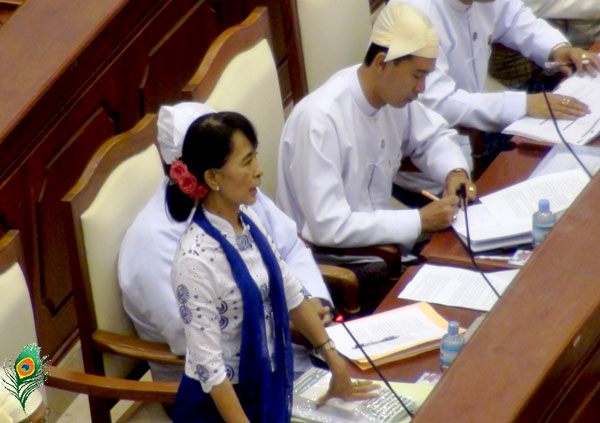Aung San Suu Kyi joined other Burmese lawmakers in calling for laws guaranteeing the rights of ethnic minorities on Wednesday, addressing her fellow members of Parliament for the first time in a short speech. However, showing her debating skills, she went beyond the narrow dimension of the law under debate and introduced broaders issues.
 She told Lower House members that laws should be made to ensure ethnic rights were guaranteed “based on equality, mutual respect and confidence for the emergence of a genuine democratic union.”
She told Lower House members that laws should be made to ensure ethnic rights were guaranteed “based on equality, mutual respect and confidence for the emergence of a genuine democratic union.”
She spoke in support of legislation offered by a member of the ruling Union Solidarity and Development Party (USDP), which is limited in scope, largely calling for the right to maintain ethnic languages and cultures.
“I would like to urge all lawmakers to enact necessary laws or amend laws to protect the rights of ethnic nationalities,” she said.
Suu Kyi mentioned a report by the Asian Development Bank which said minorities are the worst affected by poverty. She referred to soaring poverty rates in Chin, Kachin, Shan and Rakhine states, noting that protecting minority rights required more than just maintaining ethnic cultures.
“Furthermore, the flames of war are not completely extinguished,” she said. “Therefore, it can be seen that protecting the rights of the ethnic minorities is more broad-based than preserving languages and cultures.”
“The high poverty rates in ethnic states clearly indicate that development in ethnic regions is not satisfactory – and ethnic conflicts in these regions have not ceased,” she told lawmakers during her brief speech.
Her remarks signaled a “significant departure” in traditional calls for reform, Sean Turnell, a professor of economics at Macquarie University in Australia, told Voice of America.
He called her speech to fellow lawmakers “a moment in history” and said using that moment to discuss ethnic minorities, poverty and the civil war was particularly significant.
“If there is one unifying figure, it’s Aung San Suu Kyi. So in some ways, she’s the right person to talk about this particularly intractable problem,” he said.
Turnell noted that lawmakers often talk about the importance of economic reform in the country, but they generally leave the ethnic minorities out of the discussion.
“They are very often off the radar when we look at the big multilateral lenders, when we’re talking about firms going in to invest and so on," he said. “Very often the consideration for the differences and the terrible deprivation that is there for many ethnic minority areas is not just a political one. There’s also an economic dimension.”
Because many of Burma’s ethnic groups live along the Thai and Chinese borders, key trading areas rich in natural resources, Suu Kyi turned a seemingly safe domestic issue [a law on ethnic language and culture] into a global economic one.
Observers said Suu Kyi also showed savvy political instincts. She did not mention the sectarian violence in western Arakan State between Rakhine Buddhists and Muslim Rohingyas that recently left at least 78 people dead, prompting a government crackdown in the region and more than 50,000 refugees or displaced persons. Doing so would have been seen as an attack on the ruling government and blurred her points about poverty, ethnic groups and the economy.
In ethnic regions, cease-fires have been agreed to with all but one ethnic armed group, the Kachin Independence Army, and several groups have entered into discussions with the government on terms for political agreements. Economy development is a central theme of the talks, but as yet there has been no countrywide program clearly aimed at minority areas.
Suu Kyi’s party, the National League for Democracy, has been aligned with ethnic groups for decades, and Suu Kyi has called for a national conference of all ethnic groups to sort out fundamental rights issues and their relationship to the Union government.


